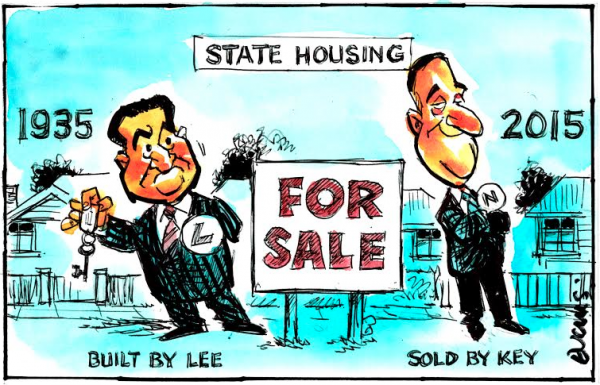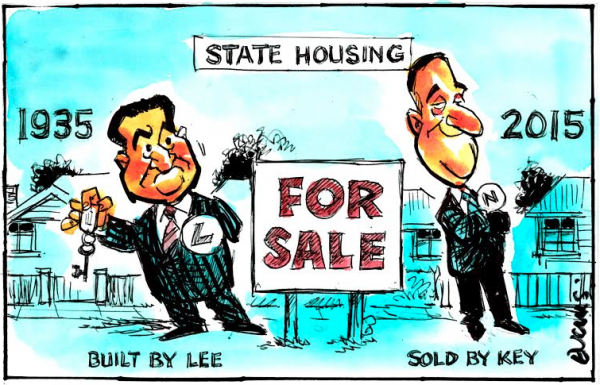
The new government has stopped the planned privatisation of large parts of the state housing stock of around 70,000 homes. At least another 30,000 had been built but these were sold off in previous years. But the current stockpile hasn’t increased in decades. The state housing stock has been starved of support for decades and become simply the place of last resort for the destitute.
Despite stopping further sales, housing remains one area where the government remains committed to almost a completely market-based solution. For various reasons in this country, housing has become a speculative nightmare with prices beyond what working people can afford.
The new government has promised tens of thousands of more private homes will be built for sale and that more of these houses will be “affordable” housing. But this seems like an empty dream unless there is a massive economic crisis and collapse in prices which would wipe out hundreds of billions of equity of NZ households and throw the country into an economic depression.
The problem the government faces is that any form of subsidy to allow working people to buy a home is simply capitalised in the increased price of the home the day after it is bought. Builders of housing projects are actually property speculators looking to make a killing not social service providers. Supervision of these projects is usually so slack that the ‘affordable houses” are simply sold on the side to friends and family to take advantage of the immediate speculative gain.
The only realistic answer is to begin the government’s fundamental duty to provide housing to those most in need first and then extend that duty up the chain of need as fast as possible. That demands the immediate launching of a massive state house building programme with life-time guarantees of tenancy at affordable rates. An initial goal of 10,000 a year is easily achievable with a determined effort.
Labour has promised only 1000 more state houses a year and the Minister of Housing Phil Twyford has said he hopes to double that. That is almost a joke. The sad fact of things is that the government could actually borrow and build state houses without breaching the “fiscal responsibility” rules because the state house becomes an asset in the government’s books.
We could also do a massive programme of community and Marae house building that could create co-operative housing forms that guarantee tenancy for life. The home must be sold back to the community with only compensation for improvements made being given rather than profit from inflated land values because the land would remain in state, local council, Marae or cooperative hands. Whole communities could be built so we no longer lived isolated individuals but as part of a broader community with accessible community centres, sports facilities, schools, child care centres, local shops not malls, parks and gardens, and areas for growing food.
In this way, the state could lead the building programme needed with quality housing being built but with modular patterns and economies of scale. Every unemployed Kiwi, including all school leavers, could be offered on-the-job trades training if they wanted it and surplus labour recruited from overseas with the promise of permanent residence from day one to prevent exploitation.
The obsession with “owning your own home” does not exist in countries as wealthy as Germany because they have lifetime tenancies and any home build must be able to last three generations!
The government has a responsibility to provide everyone who needs one a sturdy, clean, sustainable home with tenure protected. The state does not have a duty to make sure everyone has an asset for speculative gain – or loss as the case may be under capitalism.






houses in NZ are not much more than little boxes made of ticky tacky these days and even with the expensive jobs the superficial nature of everything supplied by the lowest bidder the cheapness shows through.
Good points, Mike.
The thing is, Mike, I doubt Labour are unaware of the points you made.
Therefore, it should be clear they just don’t care.
So how do you suggest we deal with that? That is the bigger challenge.
For me it’s a speculative heaven 😉
Glad you are enjoying it most aren’t. Afterall the cost of property is pure fantasy of value…
You’re absolutely correct Mike. There’s no innovation being called for here, it’s just (re)stating what any caring, responsible government would naturally know to do.
Now ask yourself why the Labour government doesn’t do it.
Better yet, since you know Phil Twyford personally, why don’t you ask him the question directly. Don’t let him of the hook, get a categorical answer from him.
Then please come back here and write another article telling us what he said.
“Then please come back here and write another article telling us what he said”
That would be interesting.
Not sure what you mean by ‘life-time guarantees of tenancy’. Do you mean overhauling tenancy law to make lifetime tenancy viable to all parties involved? Or are you suggesting during this housing crisis the government build state homes and give a lucky few a really, really good deal? Because working people, you know .. the ones paying for this ‘really good deal’ need somewhere to live too.
NZ needs factories prefabricating homes to the point we’re shipping them overseas. A home fabrication industry would solve a lot of problems here.
At some point in the past few years good old Kiwi ingenuity plummeted into the subsoil.
How come this is possible – and we’re not using it? If our delicate sensibilities are rubbed raw we could chuck in cheapo nylon carpet and other tacky tinsel Dry. Warm. Affordable. Fast – and better than sagging floors, mould, gaps round the windows in a ‘proper Kiwi home’.
https://www.designboom.com/technology/3d-printed-houses-in-24-hours-04-24-2014/
Or we could have misery fests with obligatory hand wringing. Soooo satisfying and Proper, eh?
Something has gone horribly wrong in this country over the last 50-60 years ?
We used to have some of the best tradesmen who had good reputations worldwide I worked in the building trade in Australia in the late 1970’s early 1980’s, there was always work especially if you had NZ trade certification.
National or Labour under the neoliberalism ideology did away with trade training ? Still do not understand the reasoning ? This lead to hammer hands who had just picked up a builders apron and a hammer from Bunnings to become our newly qualified carpenters ?
We have been replanting our forests since the 1920’s, however many of these got sold for a pittance under neoliberalism. Now timber prices here in New Zealand have become exorbidant and we have monopolies or oligopolies controlled by the likes of Fletchers and Carters, charging the NZ building trade whatever prices they like.
Material costs continue climbing and the costs of building houses just keep rising.
Obviously successive Governments both Labour and National have continued to let this behaviour continue ?
The Labour party are suffering from “Stockholm Syndrome?” 9 years in opposition is as good as been held hostage. It maybe time for another election to snap them out of it?
I must agree, the government has a problem though, so many ‘ordinary Kiwis’ have invested in not only their own home, also in one or more ‘investment properties.
None of those asset holders are willing to see their home values slashed, hence the Nats were voted in three terms, doing nothing much on the state and social housing front.
The investment in state housing will cost heaps of money, and few are prepared to pay more taxes for such investments. Rent to buy may be the best option after all, but that comes at a price as well.
It is true that Germany has mostly renters living in homes, and tenancy laws there are much more protective and advantageous for renters than here.
Measures need to be taken on multiple fronts, 1000 state or social homes a year is absolutely poor to start with. And ‘affordable’ first homes for new buyers at 600k are also a joke.
Mr Twyford has his work cut out as minister, will he deliver? I honestly doubt that he will achieve even the targets Labour talked about in the election campaign.
have you never bothered to find out how the 1935 gvt paid for the thousands of state houses .. give you a clue read the above article mike spells it out plainly
Yes, and other relevant info also:
https://teara.govt.nz/en/housing-and-government/page-2
It is all not as simple and straight forward as Mike and you may believe it is.
More info on this:
https://en.wikipedia.org/wiki/State_housing
Some issues with state housing, which I nonetheless still support:
State housing tended to be built in suburbs and on cheaper, available land, often distant to city centres and even work places, which contributed to the urban sprawl. Also was the construction dependent on availability of cheap materials, which was not guaranteed, as the market still set prices, and they were at times too high.
That means it is not always easy to build the affordable housing where it is needed, and it would appear also that a lot of state housing construction was also paid for by increasing the population to share the burden over future years, which though always led to new demand and new pressures.
It is true that building houses is budget neutral over time. The Mike Savage Government knew this in 1935. They also knew that they could get the the money interest free from the NZ Reserve Bank – and did. So why dont you say this, Mike?
It is true that building state houses is neutral to the Government budget in the long term. The Labour Government of Mike Savage knew this in 1935. They also knew that that the money could be obtained interest free from the NZ Reserve Bank … and did that. So why is this not mentioned in your article, Mike?
RENTING IN AUCKLAND, A BLOODY NIGHTMARE SCENARIO:
https://www.trademe.co.nz/Browse/CategoryAttributeSearchResults.aspx?search=1&cid=5748&sidebar=1&rsqid=cac1fbecb8094a1cb7146441a2d34e37&132=FLAT&selected135=7&134=1&135=7&216=0&216=0&217=0&217=0&153=&122=0&122=0&123=0&123=0&59=0&59=0&178=0&178=0&sidebarSearch_keypresses=0&sidebarSearch_suggested=0
People housed like chicken in cages, in some inner city apartment blocks. Housing in NZ Inc in 2018, a failure, a criminal exploitation of renters, time to rise up, time to squat and occupy.
As a person who lived in a state house until I was 15, and effectively had a solid foundation of a good cheap home to my life, along with thousands of others in the latter 1940’s and 1950’s, I find it criminal that this has been removed as a mainstay of our society. How the greedy sociopaths have forgotten whence we came !
You make some good points Mike but I think you miss the key point:
Building houses is really easy: But finding land to put them on is really hard.
In terms of construction (I’m a professional engineer) we can pump out good quality, factory made houses by the tens of thousands and assemble them on site. No problem! In the very worst scenario we can import them prefabricated, as some are already doing.
When it comes to housing where there is most demand (Auckland and Wellington), we face significant problems:
Geographical restrictions in both cities limits horizontal growth. In Auckland we could move the rural/urban boundary. In Wellington we need to bulldoze mountains. Neither easy.
If we wish to grow our housing stock vertically (ie high rise) we run into other snags. Firstly neither city can handle significant population growth in existing suburbs without spending billions in wastewater transport and treatment. Note that there is already excessive pollution running into the harbour from both north and south of the harbour bridge. Add to that power and drinking water reticulation. Overlaying services in existing suburbs is wildly expensive and difficult to do. Secondly high rise impinges on the lifestyle of surrounding residents so any move to build outside of the CBD will face a strong backlash.
My suggestion: New Zealand is full of lovely towns that are dying from loss of population. Why not redirect the money to encourage both business and government to move to those places? For example, why are we rebuilding the stats building in Wellington? Why not put it somewhere else? Why is government paying Bob Jones a fortune in office rental when we could relocate whole blocks of central government to the provinces where the people and the jobs are desperately needed?
Wow, Andrewo, a somewhat sensible comment for once!
Too right.
Good post, Andrew.
There’s a second option; build in satellite towns and put in good, reliable rail. Government services can be moved to satellite towns as well.
Lastly, we need to curtail migration. If high migration levels are putting a strain on available resources, then we are throwing petrol on the bonfire.
Comments are closed.